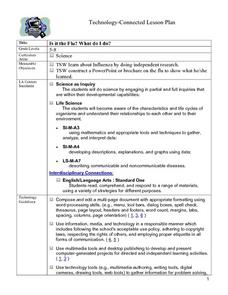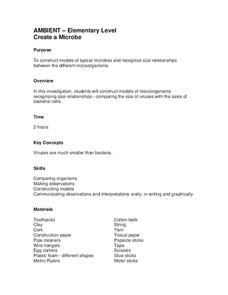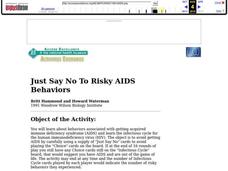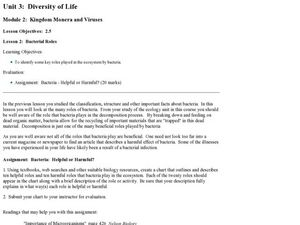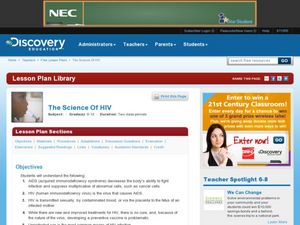Curated OER
Blood: Transport and Protection
In this blood instructional activity, high schoolers review what makes up blood: plasma, platelets, and red and white blood cells. Students also learn how the blood helps fight viruses, bacteria, and other foreign substances. This...
Curated OER
Preventing and Treating Disease
In this disease worksheet, students will review the organs associated with the immune system including their specific functions. This worksheet has 10 matching, 8 true or false, and 5 short answer questions.
Curated OER
Viruses
For this virus worksheet, 9th graders study the graph shown that illustrates the sizes of viruses, bacteria, and other structures. Then they state how large a red blood cell is and how large the smallest viruses are that affect plants....
Curated OER
Your Immune System
In this immune system activity, students identify and name treatments that are currently available for the AIDS virus. Then they discuss some potential vaccines. Students also describe how new AIDS drugs are tested.
Curated OER
Science: Finlay and Yellow Fever
Ninth graders research the work of Carlos J. Finlay and his contributions to science. Once they have discussed his theories about diseases, they create tables comparing diseases that use insects as carriers. The lesson also includes a...
Curated OER
How Germs Spread
Young scholars conduct a test to help them visualize the spread of
germs. They identify that a pandemic is an epidemic (an outbreak of an infectious disease) that spreads across a large region or even worldwide. Finally, students state...
Curated OER
Diseases
Sixth graders create a type of notebook or journal using colored copy paper on which to take notes. They complete research on a certain disease and report on it and then design their own disease causing bacteria or virus. Finally, 6th...
Curated OER
NS 6: Monerans, Viruses
Students compare the structures and functions of viruses and bacteria relating their impact on other organisms. They review the main vertebrate groups. Students are describing the characteristics of the main group of vertebrates: ...
Curated OER
Is It The Flu? What Do I Do?
Students use the internet to research the flu. Using various websites, they identify who should get flu shots, how to protect themselves and guidelines for getting over the flu. They write a one page report on their findings to end the...
Curated OER
Create a microbe
Learners explore viruses and bacteria. They construct three dimensional models of microorganisms recognizing size relationships by comparing the size of viruses with the sizes of bacterial cells.
Curated OER
Lesson Plan on HIV/AIDS
Students examine where, why, how and in what conditions HIV/AIDS exists. They examine the deadly impact this virus has had on the world and look at how to prevent the spread at home. The students also develop a greater awareness of the...
Curated OER
Just Say No To Risky Aids Behaviors
Students discover the behaviors associated with getting acquired immune deficiency syndrome (AIDS) and study the infectious cycle for the human immunodeficiency virus (HIV) by playing a board game. They play in small groups.
Curated OER
A Virtual Visit to the Microbial Zoo
Young scholars complete a WebQuest on viruses, bacteria, and protists. They explore various websites, and answer discussion questions.
Curated OER
Building a Pathway to Infection
Students experiment to discover how certain viruses spread through a population. They simulate the spread of a communicable disease by analyzing data to identify the person who was originally infected.
Curated OER
The Hijacker - How a Virus Spreads
Students view a video that presents how viruses attack the body and how the body's immune system responds. They simulate the spread of an infectious disease and establish the identity of the original carrier.
Curated OER
A Variety of Very Safe Veggies
Students study viruses and bacteria that can contaminate vegetables. They examine how vegetables can be preserved and what farmers might do to keep vegetables safe. They examine with pickling as a way to keep vegetable preserved safely.
Curated OER
A Simulation of the Spread of HIV
Young scholars participate in a simulation to illustrate the spread of HIV. They use phenolphthalein, water and test tubes to simulate the spread of the virus and discuss results and variables after the activity.
Curated OER
Gregory Carter
Students explore how the immune system, fights a war with a pathogenic organism: one of the many bacteria, viruses, and protozoans that can infect our bodies and cause disease.
Curated OER
Students Exploring Cyberspace (SECs) Project
Students study AIDS and other current topics in a multinational, interdisciplinary fashion. They communicate with students from other countries throughout e-mail to find out how AIDS impacts other societies.
Curated OER
Hazard Mitigation: Bioterrorism
Students discuss different ways to spread infectious diseases. In this bioterrorism lesson, students model the rate of smoke emission using CalRoad software. They analyze the effects of airborne release of biological...
Curated OER
Information Technology
Students identify various threats to computers today. In this technology lesson, students explore various techniques to address security issues. They demonstrate what they have learned using classroom computers.
Curated OER
Bacterial Roles
Pupils study bacteria and the role it plays in the ecosystem. For this bacteria lesson students research the roles bacteria has and submit a chart.
Curated OER
The Science of HIV
Students research about the characteristics of HIV. In this biology lesson, students cite ways to prevent AIDS especially among uninformed teens. They plan a community awareness campaign targeting teens.
Curated OER
Diversity of Life
Learners study the classification of viruses and describe their structure. In this investigative lesson students complete an activity and answer questions about viruses.










